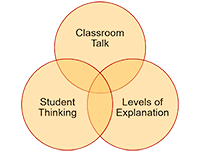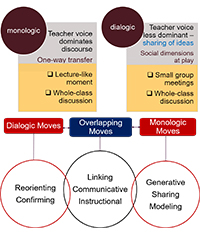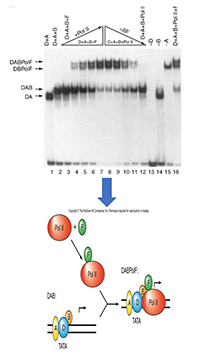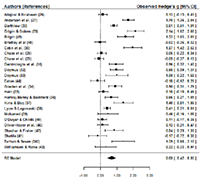Research on active learning strategies has established their effectiveness in improving student achievement outcomes in undergraduate Science, Technology, Engineering and Mathematics (STEM) courses as well as their ability to lower course failure and withdrawal rates (Freeman et al., 2014). Given the strength of this evidence, our group conducts research that aims to establish an in-depth understanding of what happens in engaged learning environments that makes them effective. We do so through analysis of classroom discourse and student-instructor interactions. We also conduct studies that examine modeling and model-based reasoning in reform environments as well as developing next generation of research methods to understand student experiences in engaged learning environments. Further descriptions of current research projects are shown below.
Analysis of Teacher Discourse Moves (TDMs) in Reform-Based Undergraduate STEM Courses
The nature and the frequency of student-teacher interactions in reform environments change as faculty attend to student learning in real time (Tanner and Allen, 2005). In so doing, faculty use various discourse moves to guide student thinking and the development of ideas in their classrooms. This includes both general conversational strategies and specific discursive practices focused on developing content knowledge. We refer to the latter as teacher-initiated discourse moves (TDMs) and believe these moves distinctly different from the general discursive practices found in all class settings. These observations raise important research questions such as how do faculty TDMs vary when facilitating student learning processes? Do varied TDMs lead to differential impact on student learning? The goals of these project is to understand the nature of faculty TDMs and to empirically quantify their impact on student learning.
Modeling and Model-Based Reasoning in Undergraduate Biological Sciences Courses
The use of conceptual models to explain biological concepts and processes is ubiquitous in the biological sciences and everyday practices scientists engage. In our research group, we are interested in understanding how engaging in modeling activities helps students learn and what are the best modeling practices that enhance student learning. In collaboration with my colleagues Sehoya Cotner and Anita Schuchardt, one particular study we’re working on engages students in what we call “Reverse Modeling Activities.” Unlike practicing biologists who use experimental data to develop models that describe underlying molecular processes, biology students tend to accumulate knowledge base of biological facts without developing deeper understanding or co-requisite scientific process skills. The RMA activities use data-centric pedagogical approach to biology teaching and learning could by tasking student to develop explanatory models from original experimental data. We are investigating the fidelity of this approach and the effectiveness of reverse modeling activities on student’s conceptual understanding on biological concepts at the molecular level.
Developing New Theoretical Frameworks—The Intersection of Science Practices and Instructor Discourse Moves
In a new project, with colleague Anita Schuchardt, that is currently underway, we are examining the science practices students engage in response to the discursive practices instructors utilize in active learning environments. We are particularly interested the cognitive demand/levels that instructor moves elicit as students respond to teacher moves. This study is currently underway and we will have update once we have preliminary data analysis.
Developing and Refining Research Methodologies for Biology Education Research
As we examine student learning of biology, we will utilize educational research methods to explain findings from the biology education research. However, given the disciplinary ethos of the divergent fields, we intend to develop new research methods that address BER questions but also refine educational and social sciences methods so that we could address disciplinary questions related to how our students learn biology. We also have long interest in meta-analysis studies that combine findings from empirical studies and assess the effectiveness of instructional practices used in active learning environments.



